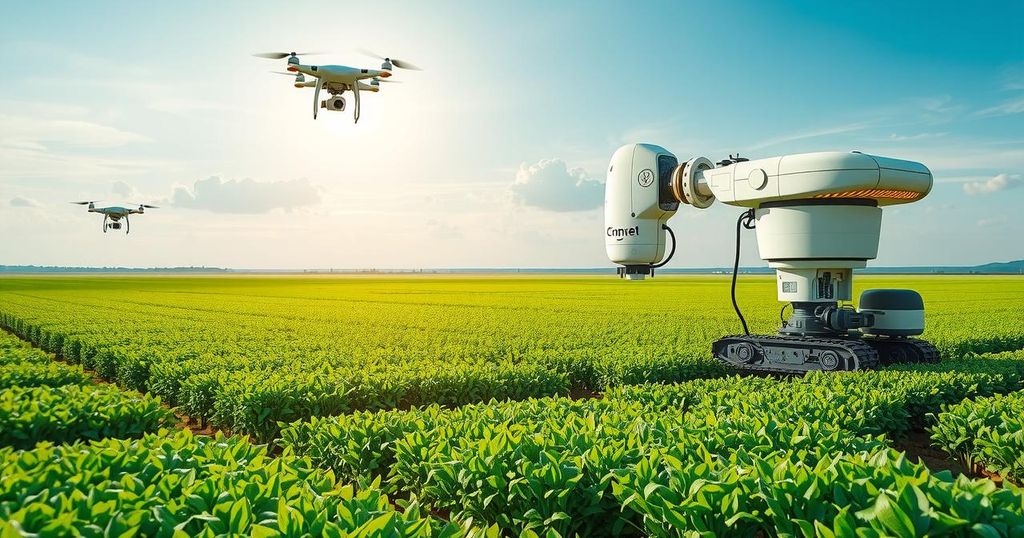AI
AFRI, AFRI FOUNDATIONAL AND APPLIED SCIENCE, AGRICULTURE AND FOOD RESEARCH INITIATIVE, ARTIFICIAL INTELLIGENCE, ENVIRONMENTAL SUSTAINABILITY, FUNDING OPPORTUNITIES AGRICULTURE AND FOOD RESEARCH INITIATIVE, INNOVATION, MARKET RESEARCH, SUSTAINABILITY, SYSTEMS AND TECHNOLOGY
Rajesh Choudhury
0 Comments
NIFA’s Bold Move To Harness Artificial Intelligence In Agriculture
- NIFA aims to integrate artificial intelligence into agriculture.
- AI will enhance efficiency in food production and supply chains.
- Innovations such as robots and drones are in development for farming.
- AI is improving decision support tools for soil and environment management.
- Funding opportunities for AI research in agriculture are available.
NIFA’s Commitment to AI Advancements in Agriculture
Artificial Intelligence (AI) is becoming a cornerstone in various fields, and NIFA, or the National Institute of Food and Agriculture, is stepping up its game to tap into this potential. They aim to catalyze AI’s integration into agriculture and the food supply chain, which, let’s be honest, is a necessity of our time. The initiative underscores that NIFA’s support spans multiple programs that focus on enhancing computer systems to tackle tasks that once demanded a human touch—think machine learning, natural language processing, and more. It’s really about using AI for smart decision-making, making production more efficient, and fostering innovative practices in agriculture.
Focus Areas Supported by NIFA’s AI Funding
NIFA currently funds various research and educational initiatives within the realm of artificial intelligence, particularly highlighting agricultural systems and engineering. This includes cutting-edge technologies like drones and precision agriculture, which aim to make crop monitoring smarter and more efficient than before. Autonomous robots are also on the rise, aimed at bustling over labor-intensive tasks such as harvesting crops in a more timely and productive fashion than humans can manage. Additionally, we see the development of nano-sensing technologies that promise to revolutionize the way we detect harmful pathogens and chemicals in our food supply. The implications here are huge; they could mean safer food and healthier crops.
AI’s Impact on Economics and Rural Development
Moving to natural resources and environmental management, AI is providing powerful decision support tools for evaluating new agricultural practices. These tools are crucial in enhancing soil health by focusing on microbiomes, nutrients, and mitigating environmental contaminants. The benefits from these advancements are not just about increased agricultural production; they also contribute to a more sustainable ecosystem overall. In terms of economic impacts, NIFA is leveraging AI to develop frameworks that aid farm and ranch managers. The goal here is to create analytical models that enable more robust economic strategies, improving resource use and consumer understanding. Essentially, AI could play a transformative role in both rural economies and community development.
Funding Opportunities for AI in Agriculture
Looking ahead, NIFA is also making strides to ensure that funding is available specifically for AI-related projects through initiatives like the Agriculture and Food Research Initiative (AFRI). This initiative is seeking proposals in several key areas such as agricultural systems and technology and the economics of rural communities. It’s set up to bolster research that not only advances our technological prowess but also addresses practical challenges faced in agriculture today. As these programs evolve, they promise to serve as a vital lifeline for innovation in agriculture, which everyone knows is a critical factor for feeding the world as demands increase.
In summary, NIFA’s commitment to integrating AI into agriculture honors its potential to revolutionize food production and supply chains. With funding opportunities and a focus on various disciplines, NIFA is making significant strides in utilizing technology to enhance economic efficiencies and sustainability in rural areas. The impacts of these advancements will likely ripple through economies and ecosystems, emphasizing the vital role of AI in shaping the future of agriculture.




Post Comment